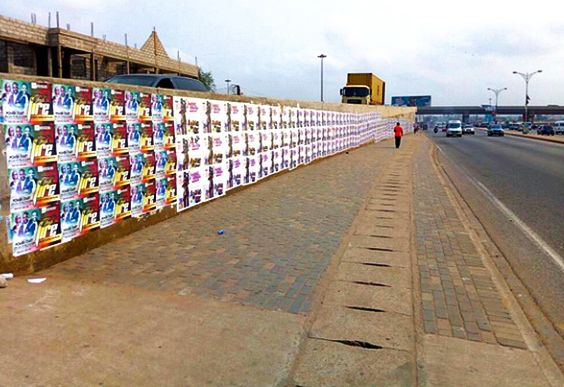
Walk through the streets of Accra, Kumasi, or any major town in Ghana, and you will see a familiar sight—posters and banners plastered on every available surface. Politicians, churches, businesses, and event organisers all compete for visibility, leaving a chaotic mix of advertisements on walls, street poles, and even trees.
The problem is not just the sheer volume of these posters but the way they are scattered haphazardly, turning our cities into visual clutter.What’s worse? Once the events are over, nobody takes responsibility for cleaning up. Worn-out posters peel off and litter the streets, while faded banners swing loosely long after their relevance has expired. The result is a cityscape that looks disorganised and neglected. Something is not right.In many developed countries, public spaces are treated with a sense of order and respect.
My visit to Oberhausen, Germany, last year, was an eye-opener. Even in that relatively small city, there was no such thing as indiscriminate poster placement. Billboards and designated advertising boards were used, ensuring that the environment remained neat and well-maintained.The irony in Ghana is that the very people who should be ensuring environmental order—politicians and religious leaders—are among the biggest culprits. Political campaign posters are pasted on every surface imaginable during election seasons, and church crusades and corporate events follow the same pattern.
Yet, after these activities, no one seems to care about the mess left behind.This reflects a deeper problem: our collective disregard for maintaining public spaces. Why do we treat shared spaces as dumping grounds while keeping our private homes clean? Why do city authorities allow this to continue?Dr. Kwasi Addai, an urban planning expert, notes, “The way we manage our public spaces is a reflection of our national mindset. In countries where people take ownership of their cities, you see order and beauty. But in places where there is no accountability, public spaces become dumping grounds.
”Beyond aesthetics, there are real environmental and economic consequences to this culture of indiscriminate poster placement. Torn posters and old banners often find their way into gutters, and during heavy rains, they contribute to choked drainage systems, which in turn lead to flooding. A flooded city is not just an inconvenience but a serious health hazard, as stagnant water becomes a breeding ground for mosquitoes and other disease-carrying organisms.
The reality is that Ghana already struggles with sanitation challenges, and this careless attitude toward poster placement only makes things worse.According to a 2023 report by the Ghana Environmental Protection Agency (EPA), “Improper disposal of synthetic waste materials, including posters and banners, accounts for nearly 15% of urban drainage blockages, exacerbating flooding in major cities.” This statistic highlights the urgent need to address the problem before it worsens.
If Ghana is serious about developing well-planned cities, then we must start enforcing order in how our public spaces are used. One major step would be to designate specific zones for posters and banners, similar to how digital billboards are regulated. These designated areas should come with strict guidelines on size, duration, and removal.
This will prevent random poster placement and ensure that advertisements do not take over every available wall and street pole.Authorities must also begin enforcing penalties for littering public spaces with posters and banners. Those who put them up should be legally required to remove them once their event is over. If they fail to do so, they should face fines or other consequences. A culture of accountability must be established, where people know that they cannot simply walk away from the mess they create.Urban policy analyst Professor Nana Biney suggests that Ghana must look to cities like Kigali, Rwanda, which is often hailed as the cleanest city in Africa. “Kigali enforces strict waste management laws and has banned the indiscriminate posting of advertisements.
This ensures that the city remains clean, organised, and attractive for both residents and visitors,” he explains.Most importantly, organisations must begin shifting towards digital advertising. In an era where social media and online platforms provide a wider reach, physical posters are becoming outdated and unnecessary.
Digital billboards, targeted social media campaigns, and radio or TV advertisements offer cleaner, more effective alternatives to indiscriminate poster placement. If businesses, politicians, and churches embrace these modern methods, it will significantly reduce the amount of poster waste littering our cities.
Ghana is a beautiful country, but we are letting our public spaces become an eyesore. The responsibility for change lies with everyone—government agencies, politicians, churches, businesses, and ordinary citizens. We must develop a culture where we not only advertise responsibly but also clean up after ourselves. A city’s appearance reflects its people. If we want to be seen as a nation moving forward, then we must start by respecting and maintaining the spaces we all share.
Renowned urbanist Jane Jacobs once said, “A city’s beauty is not in its monuments, but in the way its people care for it.” It’s time for us to care. It’s time to clean up our act.
Written by Prince Kojo Asare












